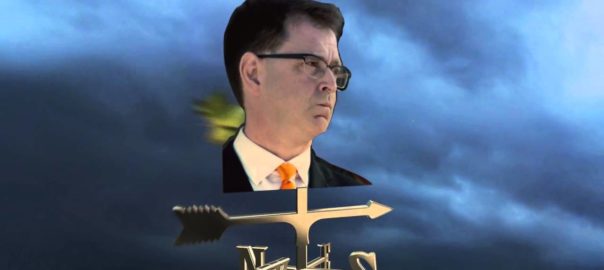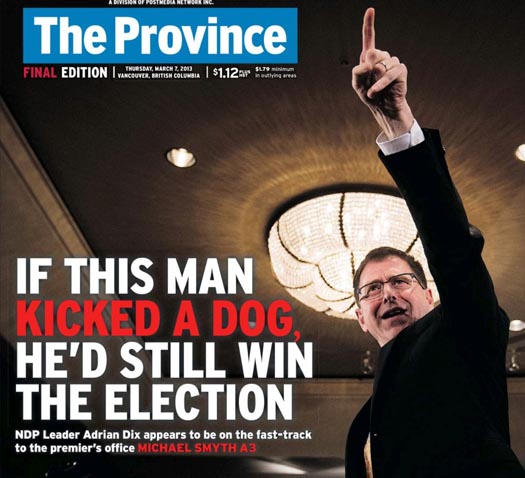
In 2013, that the Adrian Dix-led British Columbia New Democratic Party could lose the provincial election was unthinkable. Mr. Dix was popular. Ms. Clark was not. After 12 years in power, British Columbians were fed up with the B.C. Liberals. Change was in the air. And then the election happened.
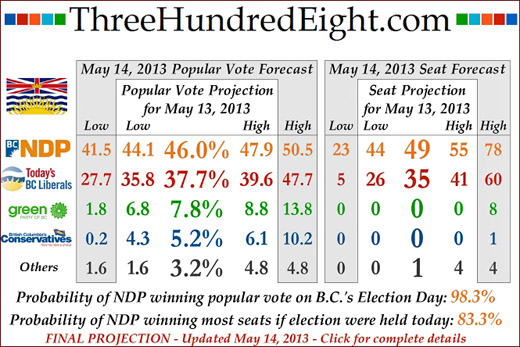 Éric Grenier’s 308.com final British Columbia election prediction, May 14, 2013 |
Despite polls which showed Adrian Dix and the BC NDP ahead by as many as 14 points, in the end such couldn’t have been further from the truth, as Christy Clark’s B.C. Liberals went on to win a 17-seat majority government, winning 50 of 84 seats in the British Columbia Legislature for a surprising and comfortable win for the first elected female British Columbia Premier.
What happened? Why did the Christy Clark-led B.C. Liberal party prevail, and why were the hopes, dreams and aspirations of B.C. New Democratic Party followers everywhere quashed, devastated, causing despondency?
Of course, there was the role Maple Leaf Strategies pollster Dimitri Pantazopoulos played, which we explored in Part 1 of this two-part series.
Next, there were the polls — which were wrong, way wrong, off on another planet wrong. So wrong, in fact, that it caused polling companies across North America to change the way they interpreted the raw data that came flowing into their offices.
Angus Reid was the first pollster to issue a mea culpa, some two months after the provincial election, writing …
“The principal flaw in our methodology was that we represented voters under 35 (where the NDP held a commanding lead) in relation to their proportionate share of the BC population (roughly 30 per cent) rather than in relation to their actual share of voters (closer to 15 per cent according to research conducted by Elections BC after the 2009 contest). Had we made this one change in our turnout projection model the final Angus Reid poll published on May 9 would have shown the NDP lead diminish to only three points.”
Of course, 20-20 hindsight looks good — but retrospect didn’t look so good for NDPers, who had believed Eric Grenier’s 338.com poll (above), his site the then credible Canadian equivalent of Nate Silver’s American fivethirtyeight.com aggregate polling website. Note should be made that following Mr. Grenier’s own mea culpa, the CBC hired him as their pollster, which he remains to this day.
When covering the 2015 federal election campaign, while traipsing through the West End one day to visit each of the Vancouver Centre campaigns, I happened into Hedy Fry’s Liberal campaign office, and had an impromptu sit down with the campaign manager (please forgive me, but I can’t recall his name), by far the friendliest of the campaign managers with whom I spoke that day, who told me, “Raymond, I always run a campaign as if I am 10 points behind. That’s the winning ethos for any successful campaign. Never believe the polls, always run your campaign as if you’re behind, keep staff and volunteers motivated and happy, and work your tail off.”
Much to their chagrin, the New Democrats believed the polls. Never again.
How the 2020 and 2013 British Columbia Election Campaigns Differ
1. A Campaign of Ideas vs A Campaign Attacking Your Opponent
In the months leading up to the 2013 B.C. provincial election, New Democratic Party leader Adrian Dix issued an edict to the party, and to his campaign officials …
“We’re going to run a clean campaign. We will not attack Christy Clark, the B.C. Liberals, or their history as government over the past 12 years. Instead, we’re going to run a relentlessly positive campaign, a campaign of ideas that speaks to the angels of the better natures of British Columbians right across the province — and that my friends will win us the 2013 British Columbia provincial election, and a majority government.”
Now, we’ve all seen Adrian Dix these past months standing next to Dr. Bonnie Henry at the podium, and as is the case with her, when referring to the deaths of British Columbians due to the ravages of COVID-19, both have a great deal of trouble not breaking down in tears. We recognize that as compassion, as humanity and caring — and not to put too fine a point on the matter, it is Mr. Dix’s innate humanity and compassion that will carry the BC NDP to victory once all the votes have been counted next month.
Meanwhile, back in 2013, the B.C. Liberals were having none of this “nicey nicey” campaign, as they went after Mr. Dix with hammer and tong, castigating him for his role in writing a letter, as then Chief of Staff to Premier Glen Clark, to support his timeline of events involving a casino application, and then proceeded to hammer Mr. Dix into the ground with the weathervane ad above, which ran with voiceover as 15-second stingers at the beginning and end of each group of evening newscast commercials on CBC, Global and CTV — at least 12 times an hour hammering Adrian Dix for having changed his mind on the proposed Kinder Morgan pipeline (he came out against it), mid-campaign, and at variance with the party policy that had been developed by NDP Energy shadow minister John Horgan.
In the annals of B.C. election campaigns, 2013 was one of the dirtiest ever.
But that was then, and this is now. 2020. And who is John Horgan’s Chief of Staff? That’s right, Geoff Meggs, who spent 9 years as a Vision Vancouver City Councillor, in a municipal political party that learned the lessons of Stephen Harper well, and ran consistently dirty — and in their case, class-based — campaigns against their Non-Partisan Association opposition.
In 2013, Christy Clark’s B.C. Liberals defined Adrian Dix as a weak, indecisive leader who would thrust B.C.’s thriving Liberal party-led economy into the ditch. In 2020, the NDP have defined B.C. Liberal leader Andrew Wilkinson — hardly the warmest and most engaging character — as a tool of his rich friends, working for “them” and not for “you”, a despicable excuse for a politician and someone who definitely does not have yours, your family’s, neighbours, colleagues and friends best interests at a heart.
The narrative the NDP have created about Andrew Wilkinson has stuck to him like glue throughout the campaign, and has defined him in the eyes of voters across the province, which by campaign’s end will lead to an overwhelming, unrepentant defeat for Wilkinson & his B.C. Liberal party.
2. 2013 Debate performance. Christy Clark Trounces a Nervous Adrian Dix. 2020. John Horgan Trounces an Uncomfortable Andrew Wilkinson.
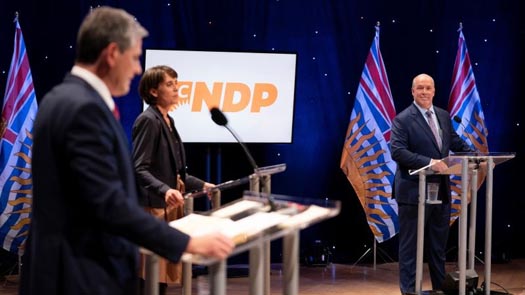
In 2013, whether it was the televised debate, or the withering radio debate on CKNW — which for years had Christy Clark in their employ as an afternoon talk show host — given her comfort with being inside the studio where she’d worked for years, where she had developed a friendly, calm and reassuring demeanour, and given Mr. Dix’s twitchy, uncomfortable and often confused and confusing debate performance, both election debates served to reinforce the notion promoted by the B.C. Liberals that Dix was unfit for office, and would make a lousy Premier. Score one for the Libs.
In 2020, it’s a whole different story. According to various of the post debate polls, 53% of British Columbians were favourably impressed with the performance of John Horgan, followed by Sonia Furstenau at 48%, with Andrew Wilkinson trailing with only a 36% favourable rating among British Columbia voters who tuned into the broadcast. Score one for the Dippers.
3. 2013 BC Libs Campaign Style = Christy “Energizer Bunny” Clark vs Dix. 2020 NDP Style = Everywhere. On Your Side, Always Working for You.

In 2013, the B.C. Liberals ran a flawless, high energy “hard hat” campaign that had the Premier making ten stops a day, every day, 7 days a week for the duration of the campaign, a high energy, relentlessly positive “chicken in every pot” campaign that promised billions in tax revenue to the province from LNG, creating the condition that would all but eliminate taxes for working people, yet provide for better education, child care, transportation and housing outcomes than could be dreamed, all provided by a Clark administration that would create a paradise on Earth for all British Columbians. Of course it was all a lie — but it sounded damn good!
NEW: BC Liberal candidate voted against town council motion recognizing that science shows ‘human activities’ cause climate changehttps://t.co/x8ZWYvJmZ6 #bcpoli #vanpoli
— PressProgress (@pressprogress) October 20, 2020
In 2020, Andrew Wilkinson’s B.C. Liberals have run one of the most inept and tone deaf election campaigns this province has ever seen, as Mr. Wilkinson and his party has lurched from one crisis to another — whether it was the sexist Zoom roast that targeted 35-year-old North Vancouver Lonsdale NDP MLA Bowinn Ma, or the homo-and-transphobic / “Contraception is Eugenics” campaign of Chilliwack-Kent Liberal MLA Laurie Throness (who has since resigned), to Langley Township Councillor / BC Liberal candidate Margaret Kunst who spoke vehemently against a rainbow crosswalk, it’s been one bozo eruption after another for the B.C. Liberals, who haven’t found an effective campaign message, running one of the lowest energy election campaigns ever by a mainstream provincial party in the province of British Columbia. Score Another One for the Dippers.
Here’s B.C. Liberal Membership Chair Nicole Paul criticizing Mr. Wilkinson …
I have long been a supporter of the BC Liberal Party. I continue to stand by the values of free enterprise that originally drew me to this party. The BC Liberal Party under Andrew Wilkinson does not reflect values I support. #bcpoli #BCelxn2020
— Nicole Paul (@nicole_paul) October 16, 2020
I am a proud ally of the LGBTQ+ community and strong advocate for women’s health, pay equity and have long advocated for free contraception. I am part of the BC Liberal coalition and these views are not minority views in the BCLP.
— Nicole Paul (@nicole_paul) October 16, 2020
And here’s Jas Johal, B.C. Liberal candidate in Richmond-Queensborough …
Laurie Throness’ comments are appalling. They don’t represent BC Liberal values. I support investing in women’s health, including free contraception. I’m proud to have played a role in making sure greater access to IVF was included in our platform. #bcpoli https://t.co/KZ7zoMFm0m
— Jas Johal (@jasjohalbc) October 15, 2020
And this is what passes in 2020 with the B.C. Liberal party, as Trump-style Republican party scare-mongering. Um … inadvisable , Mr. Wilkinson …
Honestly, do you know any BC NDP candidate that you would consider to be “radical”?
4. 2020. Diversity and Inclusion vs Sexism, All Male Slates, and Misogyny.
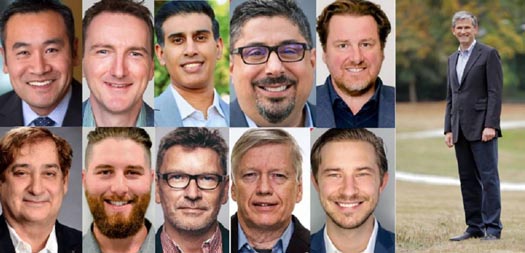 (Clockwise from upper left) the all-male B.C. Liberal candidate slate in Vancouver: Michael Lee, Alex Reid, David Grewal, George Vassilas, Paul LePage, Andrew Wilkinson, Cole Anderson, Sam Sullivan, George Affleck, Jon Ellacott, and Mark Bowen.
(Clockwise from upper left) the all-male B.C. Liberal candidate slate in Vancouver: Michael Lee, Alex Reid, David Grewal, George Vassilas, Paul LePage, Andrew Wilkinson, Cole Anderson, Sam Sullivan, George Affleck, Jon Ellacott, and Mark Bowen.
On Saturday, February 3rd, 2018, when Australian-born Andrew Wilkinson, a former B.C. Minister of Advanced Education and Minister of Technology, Innovation and Citizens’ Services in the Christy Clark government won the B.C. Liberal leadership race, he had before him a golden opportunity to renew a political party that had lost the 2017 British Columbia election, to diversify the party he now lead, and to draw in new BIPOC and LGBTQ2+ candidates, in order that his right-of-centre B.C. political party might be at least appear to present a more representative cross-section of the British Columbia electorate when the province next went to the polls.
Yet, when John Horgan called an election on Monday, September 21st to go to the people to not only seek a rewewed mandate, but to conduct a referendum on how the people of B.C. felt his government had responded to the COVID-19 pandemic crisis, B.C. Liberal leader Andrew Wilkinson, who had been leader of his party for over a year and a half, more than enough time to diversify his party and present a new, fresh face to the British Columbia electorate, presented the same old rag tag collection of out of touch anti-LGBTQ2+ and misogynist B.C. Liberal candidates.
Just take a look above at the exclusively male slate of candidates the B.C. Liberal party has on offer in Vancouver in the 2020 election. Little wonder that Wilkinson’s B.C. Liberal party is polling so poorly with women voters.
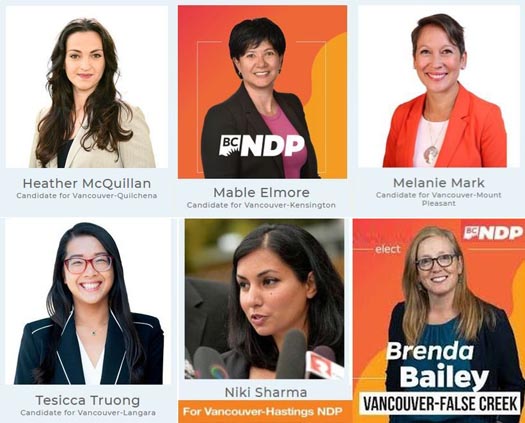
In the meantime, in Vancouver, the BC NDP are running Niki Sharma in Vancouver-Hastings, Brenda Bailey in Vancouver-False Creek, Mable Elmore in Vancouver-Kensington, Heather McQuillan in Vancouver-Quilchena, Tesicca Truong in Vancouver-Fairview, and Melanie Mark in Vancouver-Mount Pleasant. Now, let’s count, shall we? B.C. Liberal female candidates running in Vancouver in 2020 = 0. BC NDP Vancouver woman candidates = 6. Causes one to stop and think for a moment: just who does the B.C. Liberal party presume to represent? Yep, we’re talkin’ older rich men.
In 2020, the B.C. NDP are also running 5 star Indigenous candidates …
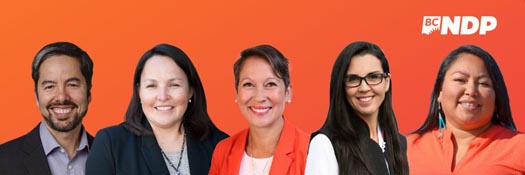 Left to right, Aaron Sumexheltza (Fraser Nicola), Ann Marie Sam (Nechako Lakes), Melanie Mark (Vancouver-Mount Pleasant) Nicole Halbauer (Skeena), Anna Thomas (Kamloops-South Thompson)
Left to right, Aaron Sumexheltza (Fraser Nicola), Ann Marie Sam (Nechako Lakes), Melanie Mark (Vancouver-Mount Pleasant) Nicole Halbauer (Skeena), Anna Thomas (Kamloops-South Thompson)
In 2020, diversity thy name is British Columbia’s New Democratic Party.
The BC NDP learned their lesson in 2013 to, in future, run a more diverse slate of candidates, representing the full spectrum of British Columbians, including Indigenous, LGBTQ2+, and the diverse persons of colour communities which comprise the British Columbia in which we all live.
The B.C. Liberal party on diversity and inclusion? Lesson not learned.
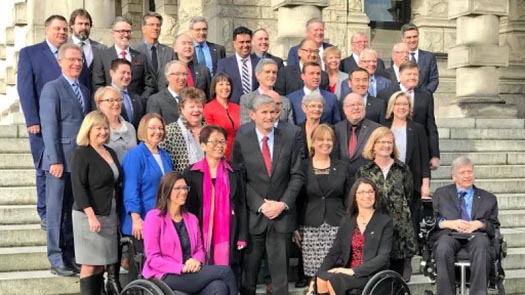
Let’s face it, let’s get real for a moment.
In 2020, the B.C. Liberals under Andrew Wilkinson have run a Trumpian campaign of intolerance for differences — perhaps not necessarily meaning to — since the outset of the campaign. With only four days to go before Decision 2020 comes to a close, there is simply no coming back from one of the most botched political campaigns in British Columbia history.
Fundamentally, how do the 2013 and 2020 British Columbia election campaigns compare? In 2013, Christy Clark’s B.C. Liberals ran a high energy, focused campaign that never, ever went off message.
Although Ms. Clark lost her own seat in Vancouver-Point Grey to newcomer David Eby, the B.C. Liberals won 50 seats, a comfortable majority, and at least for awhile, the confidence of the B.C. electorate.
In 2020, John Horgan’s B.C. NDP have run a textbook winning campaign, staying on message, reinforcing the diversity in the party and progressive values which best reflect the values of the people of British Columbia, and with only the Nathan Cullen misstep this past weekend, the 2020 B.C.NDP campaign has been flawless, high energy, positive, and — unbeatable.
The tale will be told no later than mid-month next month, when all the votes of British Columbians are counted. In the same way that Donald Trump will lose the November 3rd U.S. election in record numbers, in British Columbia, John Horgan and the New Democrats remain on track for a majority government, perhaps even a massive majority government.
